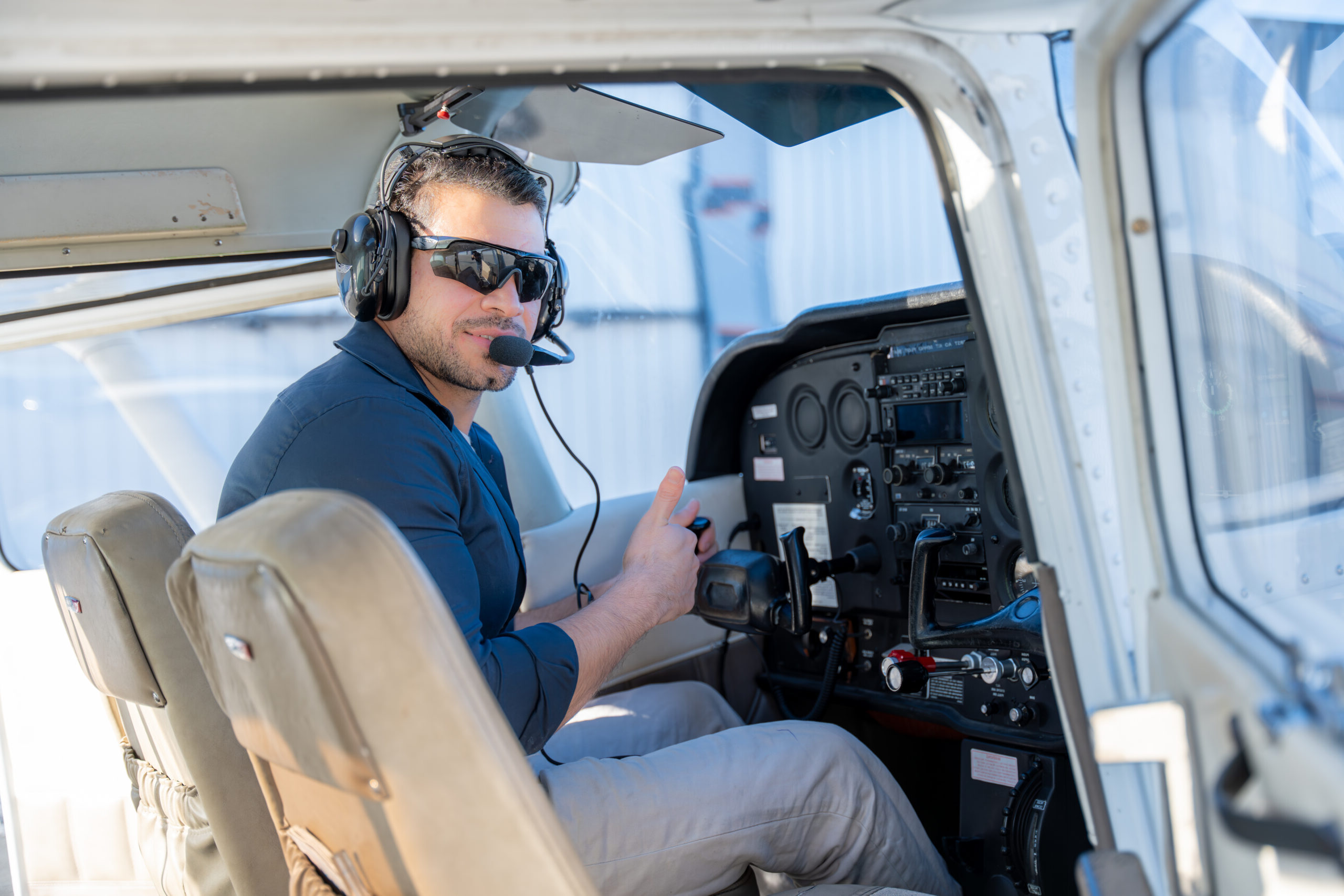Soaring through the skies, feeling the freedom and exhilaration of piloting an aircraft, is a dream for many. For those who aspire to make this dream a reality, obtaining a private pilot license (PPL) is the crucial first step. But what if you have ADHD?
“Can you get a private pilot license with ADHD?” This question is a common concern among aviation enthusiasts with ADHD. While the process of obtaining a PPL involves rigorous training, comprehensive knowledge, and strict adherence to safety standards, having ADHD adds an extra layer of complexity.
In this article, we will explore the steps required to obtain a private pilot license and address the unique challenges and possibilities for individuals with ADHD.
Can You Get A Private Pilot License With ADHD?
Yes, absolutely, you can get a private pilot license with ADHD as long as you have completed the tests and medical examinations. Read on to learn the regulations and requirements for becoming a private pilot with ADHD.
Eligibility Requirements
Pilot license requirements for ADHD include:
- Age Requirement: Candidates must be at least 17 years old to obtain a private pilot license.
- Educational Background: While a high school diploma is not mandatory, having a basic understanding of mathematics and physics can be beneficial.
- Medical Certification: Applicants must pass a medical examination conducted by an FAA-authorized aviation medical examiner. This certification ensures the candidate is physically and mentally fit to fly.
- English Proficiency: Pilots must be able to read, speak, write, and understand English, as it is the international language of aviation.
- Flight Training: Completion of a specified number of flight hours is required. This includes:
- Minimum of 40 hours of flight time: This must include at least 20 hours of flight instruction and 10 hours of solo flight.
- Cross-country flight: At least one solo cross-country flight of 150 nautical miles with full-stop landings at three different airports.
- Night Flying: Includes 3 hours of night flight training and 10 takeoffs and landings.
- Instrument Training: At least 3 hours of instrument training.
ADHD and Specific Challenges:
Getting a pilot license with adhd may be affected by the following challenges:
For individuals with ADHD, meeting the eligibility requirements can present unique challenges. Here’s how ADHD might impact each requirement:
- Medical Certification: ADHD can complicate the medical certification process. The FAA requires individuals with ADHD to undergo additional evaluations to determine if their condition is well-managed and does not interfere with safe flying. This often includes:
- Detailed medical history review: Documentation of ADHD diagnosis, treatment history, and any medications used.
- Neuropsychological evaluation: Assessment to ensure cognitive functions such as attention, memory, and executive functions are within normal limits.
- Medication considerations: Some ADHD medications may be disqualifying, and the candidate may need to demonstrate the ability to manage ADHD without these medications.
- Flight Training: ADHD symptoms, such as inattention, hyperactivity, and impulsivity, can affect flight training. Strategies to mitigate these challenges include:
- Structured learning environment: Utilizing a highly structured and supportive flight training program.
- Frequent breaks and shorter training sessions: To maintain focus and reduce fatigue.
- Use of checklists and other organizational tools: To manage tasks and ensure nothing is overlooked.
- Cognitive and Executive Functions: ADHD can impact cognitive and executive functions necessary for flying. Pilots must demonstrate:
- Strong situational awareness: Ability to remain focused and aware of surroundings.
- Effective multitasking: Managing multiple tasks and inputs simultaneously.
- Decision-making skills: Making quick, informed decisions in high-pressure situations.
FAA Regulations
Overview of FAA Regulations
The Federal Aviation Administration (FAA) sets forth specific regulations and guidelines for obtaining a private pilot license (PPL) to ensure the safety and competency of all pilots. Key FAA regulations for aspiring private pilots include:
- Age Requirement: Applicants must be at least 17 years old.
- Language Proficiency: Pilots must be able to read, speak, write, and understand English.
- Medical Certification: Candidates must obtain a medical certificate from an FAA-authorized aviation medical examiner. The medical certificate confirms that the pilot is physically and mentally fit to operate an aircraft.
- Aeronautical Knowledge: Pilots must pass a written knowledge test covering various topics, including airspace rules, navigation, weather, and aircraft operations.
- Flight Experience: Aspiring pilots must log a minimum of 40 hours of flight time, including:
- 20 hours of flight instruction.
- 10 hours of solo flight.
- Specific flight tasks such as cross-country and night flying.
- Practical Test: Pilots must pass a practical flight test (checkride) with an FAA examiner, demonstrating their ability to perform flight maneuvers, handle emergency situations, and navigate.
ADHD and FAA Guidelines
The FAA has specific guidelines for individuals with ADHD who wish to obtain a private pilot license. These guidelines are designed to ensure that the condition does not interfere with the safe operation of an aircraft. Key points include:
- Medical History Review: The FAA requires a detailed review of the applicant’s medical history, including diagnosis, treatment, and any medications used for ADHD.
- Neuropsychological Evaluation: Applicants with ADHD may need to undergo a comprehensive neuropsychological evaluation. This assessment measures cognitive functions such as attention, memory, and executive functioning.
- Medication Management: Some ADHD medications may be disqualifying for pilots. The FAA may require the candidate to demonstrate the ability to manage ADHD without the use of these medications or provide evidence of stable management on acceptable medications.
- Ongoing Monitoring: The FAA may impose additional monitoring or periodic re-evaluations to ensure the condition remains well-managed.
Medical Evaluation
Standard Medical Evaluation
All aspiring pilots must undergo a medical evaluation conducted by an FAA-authorized aviation medical examiner (AME). The standard medical evaluation process includes:
- Medical History Form: Candidates complete a detailed medical history form (Form 8500-8) covering past and current medical conditions, surgeries, medications, and any history of mental health conditions.
- Physical Examination: The AME conducts a thorough physical examination, checking vital signs, vision, hearing, cardiovascular health, and overall physical fitness.
- Vision and Hearing Tests: Pilots must meet specific vision and hearing standards to ensure they can safely operate an aircraft.
- Additional Tests: Depending on the individual’s medical history, additional tests or evaluations may be required to assess specific health concerns.
ADHD and Medical Certification
For individuals with ADHD, the medical certification process involves additional steps to ensure that the condition does not compromise flight safety. The process includes:
- Detailed Medical History Review: The FAA requires detailed documentation of the ADHD diagnosis, treatment history, and any medications used. This helps the FAA assess the severity and management of the condition.
- Neuropsychological Evaluation: A comprehensive evaluation by a neuropsychologist may be required. This assessment evaluates cognitive functions such as attention, memory, and executive functioning to ensure they are within normal limits for safe flying.
- Medication Considerations: The FAA reviews any medications used for ADHD. Some medications may be disqualifying, while others may be acceptable if the pilot demonstrates stable management and no adverse side effects.
- Functional Assessment: The FAA may require evidence of the applicant’s ability to perform daily tasks and responsibilities without impairment due to ADHD. This may include letters from employers, teachers, or other relevant individuals attesting to the applicant’s capabilities.
- Ongoing Monitoring and Re-evaluation: The FAA may impose periodic re-evaluations or monitoring to ensure the condition remains well-managed over time.
Practical Considerations
Flight Training with ADHD:
- Sustaining Attention: Difficulty maintaining focus during long training sessions.
- Impulse Control: Managing impulsivity to avoid errors in judgment.
- Executive Functioning: Challenges with planning, organizing, and prioritizing tasks.
- Multitasking: Handling multiple tasks simultaneously, such as navigating and communicating.
Coping Strategies:
- Structured Environment: Clear instructions, consistent routines, regular feedback.
- Frequent Breaks: Short, frequent training sessions to maintain focus.
- Checklists: Step-by-step guides to manage tasks and avoid oversights.
- Time Management Tools: Alarms, timers, and scheduling apps for organization.
- Visual Aids and Mnemonics: Diagrams, flowcharts, and memory aids for complex concepts.
- Mindfulness Techniques: Meditation and deep breathing to manage stress.
- Professional Support: Coaching or therapy for personalized strategies.
- Medication Management: Consulting healthcare providers for acceptable medications.
Legal Implications
When it comes to obtaining a private pilot license (PPL), there are specific legal implications and restrictions related to ADHD that aspiring pilots must be aware of:
- Medical Certification: The FAA requires a comprehensive medical evaluation for individuals with ADHD. Failing to disclose an ADHD diagnosis or related treatments can result in legal consequences, including revocation of the pilot license.
- Medication Restrictions: Certain ADHD medications may be disqualifying. Pilots must comply with FAA guidelines regarding acceptable medications and dosages. Flying under the influence of disqualifying medications can lead to legal penalties.
- Honest Disclosure: Accurate and honest disclosure of medical history, including ADHD, is legally required. Incomplete or false information can lead to fines, suspension, or permanent loss of licensing privileges.
- Ongoing Compliance: Pilots with ADHD must adhere to ongoing monitoring and re-evaluations as mandated by the FAA. Non-compliance with these requirements can result in suspension or revocation of the pilot license.
- Legal Liability: In the event of an incident or accident, failure to properly manage ADHD as per FAA regulations can lead to legal liability, including personal and financial repercussions.
Conclusion
In conclusion, obtaining a private pilot license with ADHD is possible, but it takes time and involves navigating additional medical evaluations, adhering to FAA guidelines, and implementing effective coping strategies during flight training.
Understanding the legal implications and ensuring compliance with all regulations is crucial. For personalized advice and a successful journey to becoming a licensed pilot, further research and consultation with aviation and medical professionals are recommended.
FAQ’s:
Q: Is it possible to get a private pilot license if I have ADHD?
A: Yes, it is possible to get a private pilot license with ADHD, but it requires additional medical evaluations and adherence to FAA guidelines.
Q: What specific FAA regulations address ADHD in the context of pilot licensing?
A: The FAA requires individuals with ADHD to undergo a detailed medical history review, a neuropsychological evaluation, and medication assessment to ensure safety.
Q: How does ADHD affect the medical evaluation process for pilot licensing?
A: ADHD can lead to additional evaluations, including cognitive assessments and a review of medication use, to ensure the condition is well-managed and does not impair flying abilities.
Q: Are there any flight training programs specifically designed for individuals with ADHD?
A: While there are no specific programs for ADHD, some flight schools offer structured and supportive training environments that can benefit individuals with ADHD.
Q: Are there legal restrictions on individuals with ADHD obtaining a private pilot license?
A: Individuals with ADHD must disclose their condition and comply with FAA regulations; failure to do so can result in legal consequences, including license revocation.
Q: What advice do aviation professionals offer to individuals with ADHD aspiring to become pilots?
A: Aviation professionals recommend thorough preparation, honest disclosure, utilizing coping strategies, and seeking guidance from medical and aviation experts to manage ADHD effectively.



